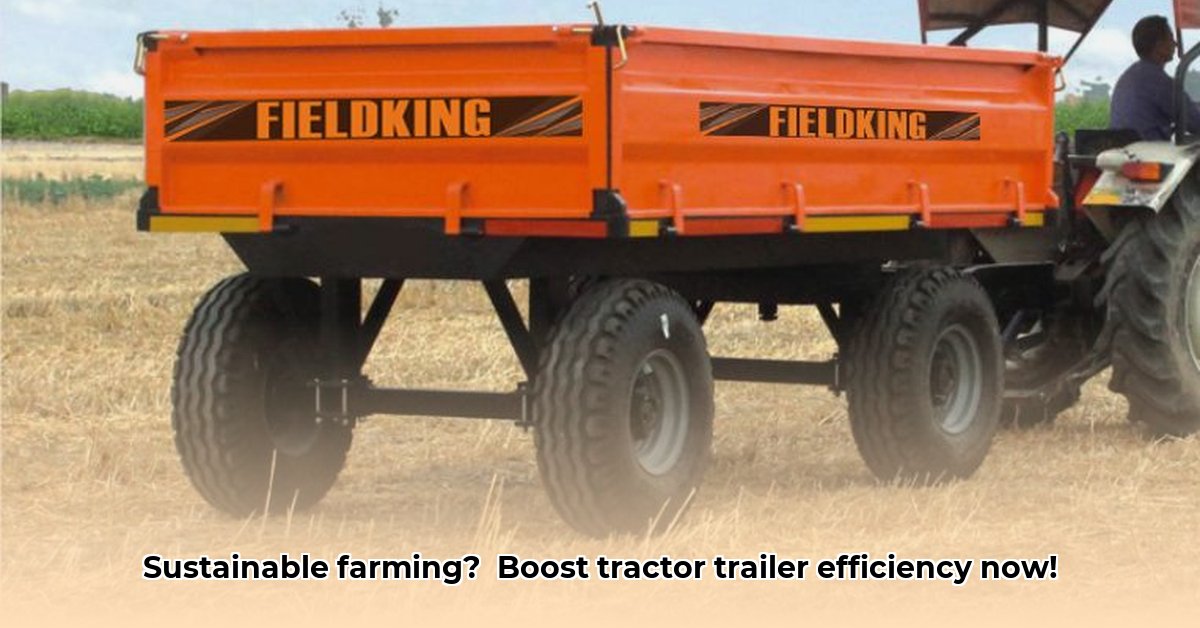
Tractor Trailers: Driving Sustainable Farming Forward
Sustainable agriculture demands increased efficiency across the supply chain. Tractor trailers, crucial for transporting agricultural goods, present a significant opportunity for improvement. This report analyzes the current state, identifies opportunities for greener practices, and assesses challenges to achieving a more sustainable transport system within the agricultural sector. For information on weight limits, see trailer weight limits.
Tractor Trailers: The Backbone of Farm Transport
Tractor trailers are essential for moving harvested crops, livestock, and equipment. Suppliers like Tractor Supply Company (TSC) offer a wide range of trailers to meet diverse needs and budgets. However, the environmental impact of these trailers remains largely unquantified. A lack of transparency regarding manufacturing materials, carbon footprint of production and transport, and end-of-life management hinders a complete sustainability assessment. This lack of data presents a significant challenge.
The Environmental Impact: A Closer Look
The environmental impact of tractor trailers stems from several key areas: fuel consumption, manufacturing processes, and end-of-life disposal. The absence of comprehensive data on these aspects limits accurate assessment of their overall contribution to the industry's carbon footprint. Data regarding emissions from fuel use, the embodied carbon in manufacturing materials, and disposal methods is critically needed to fully evaluate sustainability. How can we accurately measure the environmental cost without comprehensive data?
Opportunities for a Greener Future
Several avenues exist for improving the sustainability of agricultural transport:
Enhanced Fuel Efficiency and Reduced Trips: Optimizing trailer size and load capacity minimizes the number of trips required, directly reducing fuel consumption and emissions. This also lowers transportation costs for farmers.
Improved Animal Welfare: Well-designed trailers with features like improved ventilation, climate control, and sufficient space significantly improve animal welfare during transport, addressing crucial ethical considerations.
Innovative Materials and Designs: Utilizing lighter, stronger materials like advanced aluminum alloys or carbon fiber composites can substantially improve fuel efficiency. The development and adoption of such materials are key to reducing the environmental burden.
Challenges and Hurdles on the Road to Sustainability
Several obstacles impede the transition to more sustainable practices:
Material Sourcing and Manufacturing Processes: The environmental impact of manufacturing must be thoroughly assessed. This includes evaluating the materials used, energy consumed during production, and waste generation. The entire life cycle assessment (LCA) must be considered.
End-of-Life Management: The disposal and recycling of trailers at the end of their useful life need to be carefully managed to prevent waste accumulation and environmental harm. Sustainable end-of-life solutions, such as responsible recycling programs, are essential.
Fuel Consumption: Even with improvements in trailer efficiency, fuel consumption remains a substantial contributor to greenhouse gas emissions. Transitioning to alternative fuels (biodiesel, hydrogen) and optimizing transport routes are crucial strategies to mitigate this.
A Collaborative Approach: Steps Towards a Sustainable Future
Achieving sustainability requires collaboration among stakeholders:
| Stakeholder | Short-Term Actions | Long-Term Goals |
|---|---|---|
| Tractor Supply Company (TSC) | Conduct a comprehensive Life Cycle Assessment (LCA) of trailers. | Achieve ambitious carbon reduction targets across the entire trailer supply chain. |
| Farmers/Ranchers | Prioritize fuel-efficient trailers and optimize transport routes. | Advocate for sustainable practices with manufacturers and policymakers. |
| Environmental Organizations | Promote transparency and accountability within the industry. | Continue monitoring and advocating improvements in environmental performance. |
| Government Agencies | Offer financial incentives for adopting sustainable technologies. | Invest in research and development of cleaner transportation options. |
Mitigating Risks: A Proactive Strategy
The transition poses inherent risks. Proactive mitigation strategies include:
| Risk Factor | Risk Level | Mitigation Strategy |
|---|---|---|
| Reliance on Steel/Galvanized Steel | Medium | Transition to more sustainable alternatives such as recycled steel or aluminum. |
| High Transportation Fuel Use | High | Explore alternative fuels and optimize delivery routes. |
| Compromised Animal Welfare | High | Design trailers that prioritize animal comfort and well-being. |
How to Reduce Environmental Impact of Tractor Supply Trailers
Key Takeaways:
- Sustainable fuels (biodiesel, hydrogen, electric) offer significant emission reduction potential.
- Advanced emission control technologies mitigate harmful pollutants.
- Precision agriculture optimizes resource use, reducing fuel consumption and environmental impact.
- Government incentives and regulations are crucial for widespread adoption of greener technologies.
- Challenges remain regarding cost, infrastructure, and the scalability of sustainable fuel production.
The transition to sustainable agricultural transport requires ongoing commitment and collaboration. Through concerted effort, we can transform tractor trailers from an environmental concern into integral components of a more efficient and sustainable food system. The journey towards sustainability demands continuous innovation and proactive mitigation of identified risks.